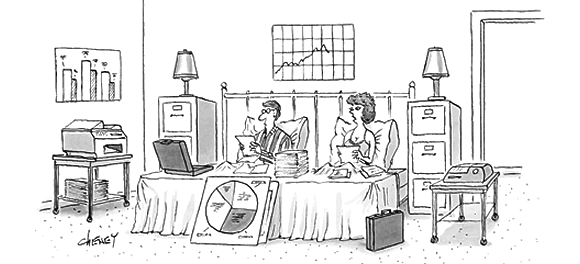First, I couldn’t find my sunglasses. We were headed out the door. Jim was halfway to the car, and I suddenly realized I couldn’t find them. They weren’t on their normal perch with the car keys in the kitchen, not on the coffee table, not beside the door. It took two extra minutes to search the house top to bottom before I found them, on the nightstand in the bedroom.
I was out the door and headed to the car before I remembered the grocery list. Another trip into the house to grab it off the fridge.
Finally, strapping the seatbelt across my chest, it hit me: “Did I turn down the thermostat?” One last sprint inside to confirm, yes, I had.
Ten minutes after we’d originally set out to leave, we pulled out of the driveway.
I felt like a crazy person. I complained to Jim, “I don’t know what the problem is. I remember intending to turn down the heat, but I can’t remember the moment when I actually did it. Same with the sunglasses. I remember walking in the house yesterday, but the moment when I set them down is completely gone. What is wrong with me?”
He shrugged back at me. “It’s normal. Took me five minutes to remember where I’d put the keys.”
And that was that. We went on with the day.
The place to run into people, in our little town, is the post office. It took me a while to adjust to the practice, (part of me was fine being the stranger-not-from-here,) but it’s customary to stop and chat with anyone you half-recognize. Mostly you talk about the weather, how quickly this year is passing, whether you’re ready for the coming of summer or winter, and, depending on the time of year, whether we’re due for rain.
And I’ve noticed, in my non-scientific polling of post office conversations, that lately the standard answer to “How are you doing?” has changed. I have always relied on that old standby, “Good. How are you?” But I seem to have missed a major shift in word usage, because my “How are you?” is rarely answered with an agreeing “Good” anymore. Now, I’m much more likely to hear, “Oh, you know. Busy.” or “Ugh. So Busy.” Or a tired sigh and a shrug, suggesting that the “busy” is so obvious, who needs words for it?
I can’t fault them for this change. When pressed for details, everyone sounds honestly exhausted. One woman has to take on an extra workload for a recently retired co-worker in the same week when her two children have both come down with some stomach flu. A harried-looking man is taking on every extra work shift he can get, hoping to cover Christmas expenses. Even the quiet older woman sighs and says she’s spent 8 hours of every day of the past week babysitting for families around town. They all seem tired, worn down, and beyond caring whether they should answer a “How are you?” with anything but the truth.
I felt a bit harried, myself, on some of those occasions, but mine was typically the privileged busy-ness of having put off a few tasks too long—paying bills, lining up posts for the Blog section of our website, getting the oil changed. I always feel guilty about complaining that I’m “busy,” when most of my stress is self-imposed, and then I feel guilty about suggesting that I’m not really busy—not like so many people around me. Isn’t it a sort of bragging, after all, to admit to being the one not-that-busy person in the room?
Really, I’ve been having this same conversation since Elementary School. I can remember so clearly sitting on the Merry-Go-Round, one among a gaggle of little girls, when one girl (the Chief Girl, of course) says, in a perfect pantomime of her mother, “Oh, I’m so tired today. I didn’t sleep at all last night.” And each girl rushing to jump in over each other, “I only slept six hours! Four hours! I’m so exhausted I almost fell asleep on the bus! I fell asleep in Math!” And I remember my bewilderment so clearly. Did I want to be tired? Was this a trick? I searched myself for signs of fatigue. Yeah, I was a little sleepy, I guess. But I had slept for most of the night before, had stayed awake through my classes.
Finally, I figured I should just keep my mouth shut. I nodded along with the others and hoped the next topic wouldn’t be who could or couldn’t do the splits.
In college, it was an equation of lack of sleep plus number of pages to be written. “Oh God,” I’d moan, “I’ve 20 pages to write today on five hours of sleep. What is this hell?” Cue the one-upmanship:
“You’re telling me. I have three different lab reports and I was studying until 7am.”
“I have major exams in five different classes in the next two days, and I haven’t had the time to open a book.”
“It turns out I was supposed to start this project a month ago, and it’s due tomorrow. Here goes.”
“I just realized. Today I’m supposed defend my senior thesis.”
Why do we want to win that battle? To be the busiest, the farthest behind, the most exhausted? What is this cultural cachet we’ve put on stress and fatigue?
And what, especially, is behind the guilt we feel when we pause to relax?
When critics of the American work culture offer their suggestions to better balance our home and work lives, they often recommend more options for employees to work from home. And, on its face, it’s a great suggestion. Workers can fit in the same amount of work, without the commute, and they will have hours more time to spend with their family.
But, for the most part, that isn’t how working from home pans out. When a person is given the option of working from home, a level of guilt sets in. “The company is giving me this gift,” they think, “a gift of more time with my family. I can’t let them think I’m using this as an excuse to slack off. I need to work harder than ever!” And so they end up working longer hours and more days than if they’d kept coming into the office. Their family life is unlikely to improve as much as they’d hoped, given that the office has now followed them home and camped out in their living room, a constant presence, where before it might have been left behind in that hour-long commute. Not to mention, even for office-workers, the company has also camped out on their laptops and their phones, which beep ceaselessly at the worker regardless of whether he is sick, or she is on vacation, or he’s just trying to have a moment right now with his kid.
You can’t just not answer that phone. What will they think? They’ll think you’re relaxing on company time—and it’s all company time now.
That feeling—constantly having something to prove—has seeped throughout the culture. The need to prove what a good worker bee you are. Each day arrives with its series of tasks, and we bustle about on those tasks until the night comes and we joke darkly about how wonderful it would be to just have a bath, read a book, drink a glass of wine. Those who work from home, either for a company or else as a stay-at-home parent, push their productivity the most. They press into each conversation the fact that they haven’t had time for a shower in days, or a moment to think in months, because they’re afraid you might not believe them. They’re afraid you might think they’ve been slacking off on the job—lying around, sleeping, eating regular meals, showering. And they think you will judge them for that.
I feel it myself, because we work on the paper from home. I feel the guilt that accompanies those moments when I’m not “productive.” Those moments when Joe or Susan, or whoever, from the post office, might see me and think I’m being lazy. Unfortunately, I’m lazy as a lizard by nature. So the guilt is a frequent companion, and it’s assuaged only by spending another few days bustling around, regardless of how many tasks I actually need to complete.
I picture, sometimes, that analogy of the duck on the pond—calm and present above the water, all the activity below the surface. Usually, when I picture it, it’s because I feel like the opposite of that duck. It’s when I feel as if all my activity is a flurry on the surface–running around, checking off tasks—and below water, I’ve lost my ability to even pay attention to what I’m doing. I run, mid-task, into a room, and then stop, confused as to why I’m there. I’m racing to gather myself so that I can leave the house, and I can’t find anything and I can’t remember clearly anything I’ve done that morning.
And those are the moments when I have to remind myself that I’m being an idiot. It doesn’t matter if I only get three loads of laundry done today. I can do the rest tomorrow. It doesn’t really matter that I answer all the emails when I see them, at 9pm. We’re not talking about Sacramental Duties, here. They can wait until morning. Getting a few things done each day is a good thing, sure. Making progress on all those tasks feels good in its own way. But all of us need to recognize that some of our time is just that—our time. It belongs to us. And it’s unconscionable for the greater world to demand that time too. Not only is there nothing wrong with letting a few of those tasks fall to the next day, to Monday, to when you’re back from vacation. It should be considered wrong not to let them fall.
And what should happen if someone sees you enjoying yourself, stretched out reading a book, taking a nap? Will they judge you? Maybe. But maybe they’ll have to think to themselves, “Why is it so decadent, really, to be able to read a book?” And maybe they’ll go home and tell their cell phone to stuff it, and finally take that bath.
Tonya Stiles is Co-Publisher of The Canyon Country Zephyr.
To read the PDF version of this article, click here.
To comment, scroll to the bottom of the page.
Don’t forget the Zephyr ads! All links are hot!










Great piece!
Wow, your piece truly struck a chord. Since switching to being a full-time, work-from-home remote employee (FTWFHRE?), I so often feel the pressure to put in that extra hour, to be available in the evenings and on weekends, and to sacrifice my free time so that I don’t appear privileged to my coworkers who have to slug to the office every morning. The reality is, while they are enjoying table-tennis breaks, afternoon cocktail hour, and company retreats, I am the one dutifully sitting behind my screen with no such breaks. I struggle to justify personal time to myself and company time to my family, and neither wins over. While I am so grateful that I am able to be home with my family, and especially with my toddler son, instead of spending hours at the office and in a commute, I often wonder if that regimen would free me from the guilt of truly enjoying *my time.*
Timely article. Peoples’ busyness seems to be getting worse. I used to think of myself as hard-working but now that I’m over 50 I’ve noticed that the younger people around me (and some of the older ones too) are very achievement-oriented and schedule their daily routines at a pace I can’t even try to keep up with. These people are usually very productive at work and at home with their families and are generally health-conscious. For the most part they do achieve and usually seem happy, which makes me feel a little guilty and ashamed that I don’t try harder to adopt their habits. I feel a bit annoyed by the ultra-health-conscious people, probably because I’m usually too tired after work to go exercise although I know it would be good for me. The outdoor recreation crowd is especially annoying when their recreation is planned out on a tight schedule and seems more focused on physical performance than relaxation or spiritual renewal. Oh well, I should probably try and learn some things from these folks (where appropriate) but really I would like to slow down a bit more, take time to think and enjoy the people and beauty around me. My preferred solution would be to reduce material and financial demands in order to simplify my life and allow more time to focus on a few important things (and reduce my impact on the planet) but obligations to my family and their expectations tend to put my daydreams on the back burner. Maybe when I retire!
First, you are a really talented writer. Excellent article! I currently am a housewife, aka domestic goddess. Though I am not domestic, nor a goddess. Nor, for that matter, a very good housewife. I have always believed that God never intended me to be one, so it always feels sort of like a practical joke that I am. But I am. I have this ridiculously large house to keep up with and now two puppies added to the big baby dog we already had.
My biggest gripe is on days when I am exhausted and really not accomplishing much, so I sit to read or watch a movie and someone calls and upon hearing what I am doing says, “It must be nice!” Really? So on a busy day when I am still in the kitchen at 9 p.m. cleaning up or up at 6 a.m. vacuuming, is that nice, too? A housewife doesn’t have set hours. We work constantly. When I am out shopping, which is not my favorite activity, my husband will call on my cell and ask if I am having fun. Fun? Really? You go get the damn bread after picking up the laundry, the prescriptions, the gift for your family member that I have never even met and don’t forget to stop by and visit the Miller’s who are insisting I come see their damn tree.
So the next time someone is tempted to tell a housewife how great her stolen little break is or how much fun she must be having shopping, don’t. Remember, she’s probably holding a frying pan with your name on it. Batter, batter, swing!
Well said, Tonya.
Some years ago a co-worker I knew well had a significant shift in her responsibilities, one in which she was at increased risk of being harried and overly busy. She asked me if I had any suggestions and I told her I believe the most important of all work.skills is how to be very slightly lazy. She gave me a funny look, not surprisingly.
I think American culture has long made being overly busy a norm, which is both weird and destructive. I’m 66 now and the hardest work I have ever done, and this includes a lot of thinking, scheming and planning, is figuring out how not to get caught up in this nonsense.
Tonya, you slacker! I imagine you even sleep late….living the good life while Jimbo brings in the millions. Well. Maybe not….